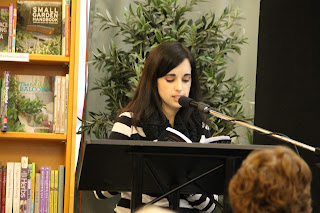Carrie fidgeted with the cardboard sleeve on her black dark roast. It wasn't easy meeting new people, but she was pushing herself to interact with other writers. Laura, an urban fantasy writer, sat across from her, nursing a grande caramel frappuccino. Did she know how many calories were in that thing?
Their get-to-know-you coffee was going well. Laura finished her lengthy oration about how she got involved in writing and took a breath before asking, "how many brothers and sisters do you have?" Carrie wrapped her hands around the hot paper cup and squeezed. Why that question? "Um."Carrie's heart sped and her mouth went dry. "That's a damned personal question for our first coffee."
One of my favorite books on writing is
Wired for Story by Lisa Cron. I'd read it a couple years ago and a particular chapter really stood out to me--chapter six, The Story is in the Specifics.
Last week, during my writers' group, this chapter came to mind as I listened to one of our members,
Gabriele Goldstone, a historical fiction writer, read from her work-in-progress. If you haven't read one of Gabriele's books, you should. She's mastered this technique of bringing in specifics without bogging down her story.
The specifics can mean the difference between the reader just reading a story and living a story. Cron quotes neuroscientist V.S. Ramahandran,"Humans excel at visual imagery. Our brains evolved this ability to create an internal mental picture or model of the world in which we can rehearse forthcoming actions, without the risks or penalties of doing them in the real world."
Cron goes on to write, "Yet writers often tell entire stories in general, as if concepts alone are captivating or worse, because they've fallen prey the misconceived notion that it's the reader's job to fill in the specifics."
In the above example, Carrie didn't just fidget with her coffee cup, but with a specific type of coffee cup with a specific type of coffee. Laura is not just a writer, but a specific type of writer. What has the reader learned about these characters? By getting into the specifics, I've been able to convey information that creates a strong visual image for the reader, but also gives insight into the personality of the characters. We now know that Carrie is an uptight, controlled, and reserved person with a past. Laura, on the other hand, is more outgoing, light, and open. I've shown the reader those characteristics, without telling them.
While the specifics can make a story shine, they can also bog it down. Cron tells writers, "Your job is to filter out the details that don't matter a whit so you have plenty of space left for the ones that do." The writer must choose which items to get specific about and which to gloss over. How do you do that? Ask yourself if the specific description serves a purpose. Does it move the story forward? Does it tell us something important about the setting or characters? Does it engage one of the five senses to bring the story to life? Is the pacing in the scene conducive to providing details?
Take a look at one of your scenes. Are there places where you can tuck in brief details that will bring your story to life?
Any questions? Please post them in the comments.
***********************
Melinda Marshall Friesen writes speculative fiction for teens and adults. Her YA dystopian novel,
Enslavement, has been nominated for multiple awards. She works as marketing director and aquisitions editor at
Rebelight Publishing Inc. Learn more about her and her books at
www.melindafriesen.com.
,
 We’d all attended book readings that went on too long. Fidgeting
sets in. Phones are covertly checked for
the time. At some point, people simply stop listening and zone out. For this
reason, I tend to err on the side of taking up less time rather than more. It
seemed to be consensus that five to ten minutes was reasonable and fifteen was
far too long.
We’d all attended book readings that went on too long. Fidgeting
sets in. Phones are covertly checked for
the time. At some point, people simply stop listening and zone out. For this
reason, I tend to err on the side of taking up less time rather than more. It
seemed to be consensus that five to ten minutes was reasonable and fifteen was
far too long. 


